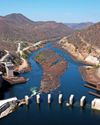
In his 2019 book Midnight in Chernobyl, the British writer Adam Higginbotham reconstructed the latter event in forensic detail, building up to the meltdown and tracking its aftermath with the skill of a great thriller writer. It's one of the most queasily compelling books I've ever read, and the scenes in which ill-equipped workers venture into the stricken reactor in the hope of containing the fallout are permanently seared into my memory.
Now Higginbotham is tackling the former event, and despite the awful spectacle of the Challenger disaster and the media frenzy around it at the time-heightened by the presence on board of the charismatic schoolteacher Christa McAuliffe - it would seem the more difficult of the two incidents to turn into a nonfiction pageturner tense enough to make your palms sweat.
For one thing, the Challenger's demise though it punctured Nasa's reputation for competency under pressure, and rattled the US's conception of itself as a spacefaring nation - did not have the empire-toppling force of Chornobyl, which also hobbled the cause of nuclear energy. For another, though the key event at Chornobyl unfolded very quickly, the danger persisted long after the meltdown and rippled outwards to affect millions of people.
The Challenger disaster, by contrast, was over within seconds, and besides the impact on the astronauts and their families, the main damage in the aftermath was to the reputations of those who pushed for the launch despite being aware of fatal flaws in the technology.
This story is from the {{IssueName}} edition of {{MagazineName}}.
Start your 7-day Magzter GOLD free trial to access thousands of curated premium stories, and 9,000+ magazines and newspapers.
Already a subscriber ? Sign In
This story is from the {{IssueName}} edition of {{MagazineName}}.
Start your 7-day Magzter GOLD free trial to access thousands of curated premium stories, and 9,000+ magazines and newspapers.
Already a subscriber? Sign In

Friendship interrupted
They were best mates. Then one had a baby, while the other struggled to conceive. They share their brutally honest takes on what happens when motherhood affects friendship

KERNELS OF HOPE
During the siege of Leningrad, botanists in charge of an irreplaceable seed collection, the first of its kind, had to protect it from fire, rodents-and hunger

A new horizon' The inverse link between cancer and dementia
Scientists have long been aware of a curious connection between these common and feared diseases. At last, a clearer picture is emerging

Across the universe
Samantha Harvey won the Booker prize with a novel set in space. Yet, she says, Orbital is actually 'a celebration of Earth's beauty with a pang of loss'

Frank Auerbach 1931 -2024
Saved from the Holocaust, this artist captured the devastation of postwar Britain as ifits wounds were his own but he ultimately found salvation in painting

Seven lessons I've learned after 28 years as economics editor
Margaret Thatcher was Britain's prime minister and Neil Kinnock was leader of the Labour party.

Droughtstricken dam leaves economies powerless
A ll is not well with the waters of Lake Kariba, the world's human-made lake largest A punishing drought has drained the huge reservoir close to record lows, raising the prospect that the Kariba Dam, which powers the economies of Zambia and Zimbabwe, may have to shut down for the first time in its 65-year history.

Let this be the end of these excruciating celebrity endorsements
I wish celebrities would learn the art of the French exit. But they can't, which is why Eva Longoria has announced she no longer lives in America. \"I get to escape and go somewhere,\" she explained.

Alive, but unable to thrive under absolute patriarchy
Since the Taliban returned to power, women and girls have tried defiance, but despair at their harshly restricted lives

‘It's tragic’ Reflection in the wake of Amsterdam violence
Carrying signs scrawled with messages urging unity, they laid white roses at the statue of Anne Frank, steps away from the home where her family had hidden from Nazi persecution.